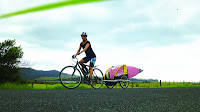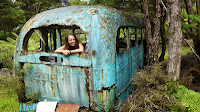My Dutch friend Simone
Knaapen, whom I met in the surf when she was in Sydney a
few years ago, found out first-hand what she could (and couldn't) get by without when she went to Great Barrier Island (Aotea) recently.
“The Barrier”, as locals call it, is in New Zealand, just east of the outstretched, north-west pointing arm of the North Island - and forms a natural barrier between Hauraki Gulf and the open ocean.
“The Barrier”, as locals call it, is in New Zealand, just east of the outstretched, north-west pointing arm of the North Island - and forms a natural barrier between Hauraki Gulf and the open ocean.
 |
| Simone and the catch of the day |
Her real destination, however, was a month of solitude, surfing and simplicity.
Sounds like heaven to me, so I asked her about it (by email) on her return.
I heard about it from a
Kiwi I met in Western Australia a few years ago and I’d been dreaming of doing
a surf trip by bike since I started surfing five years ago. Because the island
is only 47 kilometres long, it seemed like it wouldn’t be too far to ride
between surf spots – although for a Dutch girl used to flat terrain it was a
bit challenging cycling up the island’s hills, with camping gear and a
surfboard! Also, I was curious about “off the grid” living. So staying on this
tiny island for a month I hoped to get to know its people and way of life.
How would you describe the
island, in five words?
The purest way of living.
What was a typical day like for you?
 I’d wake up with the warmth of the sun coming over
the nearest hill, then I’d walk to the beach barefoot to check the waves, do
some stretches or go for a swim.
I’d wake up with the warmth of the sun coming over
the nearest hill, then I’d walk to the beach barefoot to check the waves, do
some stretches or go for a swim. Living on “Barrier-time”, taking things hour by hour, not knowing what the day would bring, every day presented unexpected adventures: surfing, fishing, cycling, snorkelling for paua (abalone), hiking in Great Barrier Forest, or playing table tennis and chilling out with the locals.
At most of the
campsites I was the only person camping. When night fell, especially around the new moon, it was so dark I couldn’t see my own hands if I stretched my arm in
front of me. The sky was full of stars.
Although I was by myself
almost all the time I never felt alone. I was constantly surrounded by the
sounds of the wind and birds and the amazing views of the hills, trees, beach
and sea, even when I was doing simple things like making porridge or washing clothes. And I think I experienced all this so intensely because I was alone - four weeks with a total lack of brick, concrete, billboards, fashion,
mobile phones, traffic lights and only a handful cars not driving faster than
45 kph.
 |
| Simple living |
Did you miss anything about civilisation?
One outcome of this "back to basics" trip that I never expected is a greater appreciation of my daily life back in the
Netherlands. For the past few years I’ve been complaining about how noisy, busy
and cramped Amsterdam can be.
But on this trip I realised I’m really happy to live in a place with such a great diversity of people with different cultural backgrounds, different outlooks on life. It’s also the only place where all my friends and family live, and where I can go to a gay bar on Friday night and be at the beach surfing on Saturday morning within a 40-minute drive.
But on this trip I realised I’m really happy to live in a place with such a great diversity of people with different cultural backgrounds, different outlooks on life. It’s also the only place where all my friends and family live, and where I can go to a gay bar on Friday night and be at the beach surfing on Saturday morning within a 40-minute drive.
My stay at the Barrier really
helped me focus on living a simpler life in Amsterdam and cutting out
things I don’t like anyway like commercial entertainment and buying clothes. I’ve started my own veggie garden and have
decided to only buy second-hand things on ebay (from individuals) and from
local shops, and no new clothes for the next year. It feels great, I believe I'm helping the environment and it saves a lot of time and money too. On Great Barrier I was happy not having to go to the supermarket.
In Amsterdam I’ve deleted the supermarket from my world too (well, almost)!
What advice would you give others wanting to do something like this?
My only travel advice is
to take it slowly. Lose the goal of trying to see everything. For me travelling is not about “seeing” so much as about getting
in touch with the place and its atmosphere, with the locals and their way of
living. You can only get to know and feel that when you hang around for a while.
[Simone's now happily back in Amsterdam looking forward to a European summer. Meanwhile, I'm dreaming of escaping the Sydney winter...]
[Simone's now happily back in Amsterdam looking forward to a European summer. Meanwhile, I'm dreaming of escaping the Sydney winter...]




Great interview Louise. I've always wanted to go to Great Barrier island - though not quite the way Simone did.
ReplyDeleteThanks Briar, me too - sounds like a special place. There's something about small islands...
ReplyDeleteThis is a really informative interview. I really enjoyed reading it and found out a lot of interesting information.
ReplyDeleteThanks! Hope you keep enjoying No Impact Girl's posts. You're welcome anytime :)
ReplyDelete